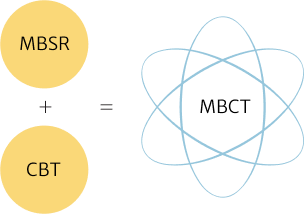Our approach to mindfulness
At AMVN, we reflect on two key questions:
- How can we introduce mindfulness in a way that honors ancient contemplative traditions while grounding on scientific evidence?
- How can we make mindfulness more accessible where we are?
These reflections have guided our decision to adopt Mindfulness-Based Cognitive Therapy (MBCT) and its adaptations, as they best support our mission to integrate mindfulness into mainstream settings. At the same time, we acknowledge and appreciate the value of other mindfulness-based approaches, each offering its own strengths and distinct intentions.
What is a Mindfulness-Based Cognitive Therapy (MBCT) program?

Source: adapted from ‘Essential Resources for Mindfulness Teacher, 2021’
MBCT is a ‘unique fusion’ of ancient wisdom and modern psychology. It blends mindfulness practices from contemplative traditions with Cognitive Behavioral Therapy (CBT) to enhance mental well-being. It was co-developed by Zindel Segal, Mark Williams, and John Teasdale—drawing inspiration from Jon Kabat-Zinn’s work on Mindfulness-Based Stress Reduction (MBSR).
Developed as an 8-week and skills-based group program, MBCT was originally designed to prevent depression relapse in clinical settings. It has been adapted and widely taught for the general public and across the workplace environments. This year marks 30 years of MBCT making a meaningful impact on clinical care and public wellness.
Empirical studies and meta analyses consistently suggest that mindfulness-based programs like MBCT help improve mental wellbeing. Randomized controlled trials confirm that MBCT reduces the risk of depression relapse by 50% and is as effective as antidepressants (Kuyken et al., 2016). Recognizing its impact, the UK’s National Institute for Health and Care Excellence has officially recommended MBCT for preventing recurrent depression (NICE 2009).
Video: MBCT is coming of age
